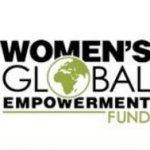In cooperation with our longstanding partner, Crowdrise, The Huffington Post is celebrating its 10 year anniversary by focusing on the promise of the next 10 years ahead. We're highlighting causes that are near and dear to our ethos -- causes where we believe meaningful strides can be made in the coming decade -- and empowering readers to act and take part. Join us!
 By Karen Sugar
By Karen Sugar
Karen Sugar is the founder and director of Women's Global Empowerment Fund (WGEF). Her masters studies at the University of Colorado focused on gender and development concentrating on the concept of microfinance. WGEF and its programs developed in partnership with local NGO Volunteer Action Network have been recognized by the Ugandan Ministries of Education and Health.
The empowerment concept gives life to the idea that a woman can be an agent of change in her own life, determining her own future. But defining empowerment is nearly impossible. The way we see others, and ourselves, is subjected to our own life experiences, perspectives, culture and values. It is also defined according to (societal) norms, market-based and political agendas. As a graduate student studying international gender and development and working in various global communities, I became keenly aware of the narrow vision (including my own) of what an "empowered" woman looks like.
The development and philanthropic world is always seeking the next trend or concept to energize the mission, funding and purpose. The word "empowerment" is one such word or theory used, and one could suggest, overused in creating a narrative that focuses on women. Because of the varying ideas associated with the word, the concept is hard to track, and norms are not well established.
There is a general consensus that women in the Global North (higher income countries) are more empowered and live with a certain level of equality. There is also an assumption that women in the Global South (lower income countries) are not "empowered"; it is also suggested that women wearing the veil, or other coverings, are less empowered and oppressed solely by the garment. In my work, some of the most powerful and capable women I have met wear a head covering or may be in a plural marriage, thus creating the paradox of what empowerment looks like. Globally, women struggle for basic human rights and equality. While religious or culturally conservative women may wear a veil or body covering, women in the US are undergoing painful procedures in order to look pleasing; oppression takes on many forms. While women may have more opportunities in the Global North for work and career choices, they are often paid less than their male counterparts; gender-based violence is a stubborn and pervasive problem around the globe, creating disenfranchisement and inequality.
My point in highlighting comparisons or contrasts is to build the connectedness of women, allowing for a richer discussion of what empowerment might look like.
Working Towards Empowerment
In a moment of brilliance or insanity, I founded Women's Global Empowerment Fund (WGEF) in Uganda, a country I had never been to that was recovering from a long and brutal civil insurgency. I created the organization based on the belief that women are natural leaders and, when offered meaningful opportunities, are able to rise above abject poverty with dignity, while advancing self-determination.
I created a model for microfinance and development called Credit Plus; what makes this intervention unique is the inclusion of a political dimension. Poverty is the result of inequality in many spheres, and meaningful interventions must include a political dimension that enables addressing systemic inequality through participation and advocacy.
Within the context of my work, I define empowerment as "one's ability to access resources, make choices and determine life outcomes." While many definitions are focused on financial mobility, I contend it is much more complex, suggesting financial agency alone does not create empowerment, but may be a catalyst to other variables that enable empowerment; other variables are contextually important and valuable in the process. Below is the list I use in my work to define/evaluate empowerment:
1. Increase in participation in household (decisions)/community activities
2. Increase in mobility
3. Decrease in violence
4. Increase in decision making (personal, household, financial)
5. Increase in health, food security, access to care, rest
6. Increased self-esteem/confidence
In assessing our program success, we do not include a specific financial measurement; access to financial resources alone does not necessarily translate into greater autonomy, increased security or mobility.
Because empowerment is multidimensional, one must be careful when drawing conclusions. A woman may be empowered in one sphere (household, community, economy) but not another. It is important not to overlook or place more importance on one area over another, as long as the focus remains on self-determination and ability to shape one's life.
Financial inclusion, microfinance schemes and other traditional interventions may be ways to empowerment, but I suggest that true empowerment comes from more complicated human experiences such as autonomy, participation and voice.
The idea that empowerment can somehow exist without basic human rights or access to basic human services is incorrect, but much easier to discuss. The empowerment of any human being must first begin with the notions of social, economic and environmental justice, making the goal of empowerment more complex, albeit more meaningful.
One could argue that if the goal is true empowerment, we must go further and suggest that all human beings experience equal and full access, and not just one gender over another. Empowerment must include equality and liberties for all; only when all people are imbued with dignity, justice and human rights can we say that we are empowered.